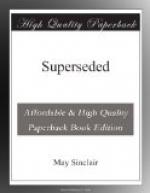She, Miss Quincey, was a little dry, brown woman, with a soft pinched mouth, and a dejected nose. So small and insignificant was she that she might have crept along for ever unnoticed but for her punctuality in obstruction. As St. Sidwell’s prided itself on the brilliance and efficiency of its staff, the wonder was how Miss Quincey came to be there, but there she had been for five-and-twenty years. She seemed to have stiffened into her place. Five-and-twenty years ago she had been arithmetic teacher, vaguely attached to the Second Division, and she was arithmetic teacher still. Miss Quincey was going on for fifty; she had out-lived the old Head, and now she was the oldest teacher there, twice as old as Miss Vivian, the new Classical Mistress, older, far older than Miss Cursiter. She had found her way into St. Sidwell’s, not because she was brilliant or efficient, but because her younger sister Louisa already held an important post there.
Louisa was brilliant and efficient enough for anybody, so brilliant and so efficient that the glory of it rested on her family. And when she married the Greek master and went away Juliana stayed on as a matter of course, wearing a second-hand aureole of scholarship and supporting a tradition.
She stayed on and taught arithmetic for one thing. And when she was not teaching arithmetic, she was giving little dictations, setting little themes, controlling some fifty young and very free translators of Le Philosophe sous les Toils. Miss Quincey had a passion for figures and for everything that could be expressed in figures. Not a pure passion, nothing to do with the higher mathematics, which is the love of the soul, but an affection sadly alloyed with baser matter, with rods and perches, firkins and hogsheads, and articles out of the grocer’s shop.
Among these objects Miss Quincey’s imagination ran voluptuous riot. But upon such things as history or poetry she had a somewhat blighting influence. The flowers in the school Anthology withered under her fingers, and the flesh and blood of heroes crumbled into the dust of dates. As for the philosopher under the roofs, who he was, and what was his philosophy, and how he ever came to be under the roofs at all, nobody in St. Sidwell’s ever knew or ever cared to know; Miss Quincey had made him eternally uninteresting. Yet Miss Quincey’s strength was in her limitations. It was the strength of unreasoning but undying conviction. Nothing could shake her belief in the supreme importance of arithmetic and the majesty of its elementary rules. Pale and persistent and intolerably meek, she hammered hard facts into the brain with a sort of muffled stroke, hammered till the hardest stuck by reason of their hardness, for she was a teacher of the old school. Thus in her own way she made her mark. Among the other cyphers, the irrelevant and insignificant figure of Miss Quincey was indelibly engraved on many an immortal soul. There was a curious persistency about Miss Quincey.




